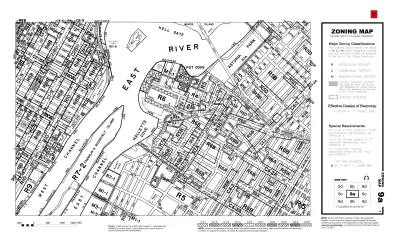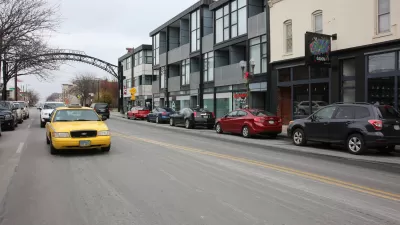A new database measures the restrictiveness of exclusionary zoning practices around the country. Exclusionary zoning, it turns out, is much more prevalent than commonly acknowledged.

The Eviction Lab has created a new tool to document exclusionary zoning practices around the United States as a first step creating the new housing necessary to ease rising housing costs in communities.
Writing for the Eviction Lab, Matt Mleczko and Matthew Desmond introduce the challenge of reforming zoning when so little is known about zoning in the aggregate.
“Zoning is fundamental to the make-up of our communities and our neighborhoods, but understanding these regulations and how they vary within and between places is enormously challenging. In large part, that’s because we lack straightforward, nationwide data,” according to the article.
Mleczko, Desmond, and the team at the Eviction Lab are attempting to fill that void with the launch of the National Zoning and Land Use Database (NZLUD). The duo have also authored an article for the Urban Studies journal to describe the process of creating the NZLUD, and have shared their data and code on GitHub.
The process created a metric the team dubbed the Zoning Restrictiveness Index (ZRI) to compare the restrictiveness of development regulations across jurisdictions. “We find highly-restrictive zoning policies in some of the coastal metro areas you might expect—Washington DC, New York, Seattle—but also in rustbelt metro areas like Milwaukee and Detroit,” write Mleczko and Desmond. “This underscores that exclusionary zoning is more common than many have acknowledged, both across and within metro areas.”
As measured by the ZRI, the most restrictive metropolitan areas are 1) Washington-Arlington-Alexandria, DC-VA-MD-WV; 2) New York-Northern New Jersey-Long Island, NY-NJ-PA; 3) Providence-New Bedford-Fall River, RI-MA; 4) Seattle-Tacoma-Bellevue, WA; and 5) Tampa-St. Petersburg-Clearwater, FL.
The remainder of the top ten, which, perhaps shockingly, does not include any Californian metropolitan areas, can be found at the link below. Example maps of depicting ZRI quintiles for the San-Francisco-Oakland-Fremont metropolitan statistical area (MSA) and the Houston-Sugar Land-Baytown MSA are also included.
FULL STORY: To reform exclusionary zoning, we first need to document it. Now we have a tool for that.

Study: Maui’s Plan to Convert Vacation Rentals to Long-Term Housing Could Cause Nearly $1 Billion Economic Loss
The plan would reduce visitor accommodation by 25,% resulting in 1,900 jobs lost.

North Texas Transit Leaders Tout Benefits of TOD for Growing Region
At a summit focused on transit-oriented development, policymakers discussed how North Texas’ expanded light rail system can serve as a tool for economic growth.

Using Old Oil and Gas Wells for Green Energy Storage
Penn State researchers have found that repurposing abandoned oil and gas wells for geothermal-assisted compressed-air energy storage can boost efficiency, reduce environmental risks, and support clean energy and job transitions.

Santa Barbara Could Build Housing on County Land
County supervisors moved forward a proposal to build workforce housing on two county-owned parcels.

San Mateo Formally Opposes Freeway Project
The city council will send a letter to Caltrans urging the agency to reconsider a plan to expand the 101 through the city of San Mateo.

A Bronx Community Fights to Have its Voice Heard
After organizing and giving input for decades, the community around the Kingsbridge Armory might actually see it redeveloped — and they want to continue to have a say in how it goes.
Urban Design for Planners 1: Software Tools
This six-course series explores essential urban design concepts using open source software and equips planners with the tools they need to participate fully in the urban design process.
Planning for Universal Design
Learn the tools for implementing Universal Design in planning regulations.
Ascent Environmental
Borough of Carlisle
Institute for Housing and Urban Development Studies (IHS)
City of Grandview
Harvard GSD Executive Education
Toledo-Lucas County Plan Commissions
Salt Lake City
NYU Wagner Graduate School of Public Service





























